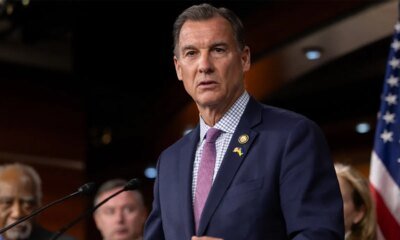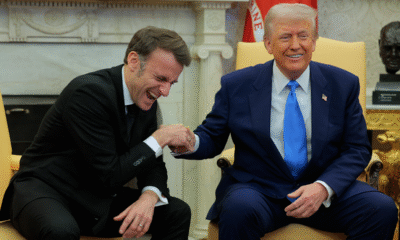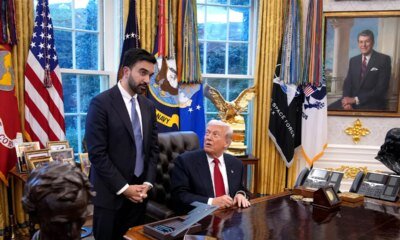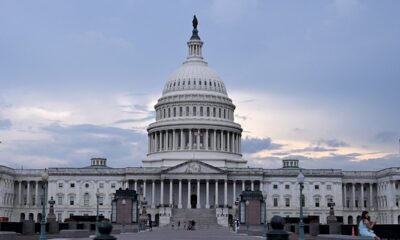INTERNACIONAL
«Es ilegal»: la reacción de Harvard ante el anuncio de Donald Trump por la prohibición de matricular estudiantes extranjeros
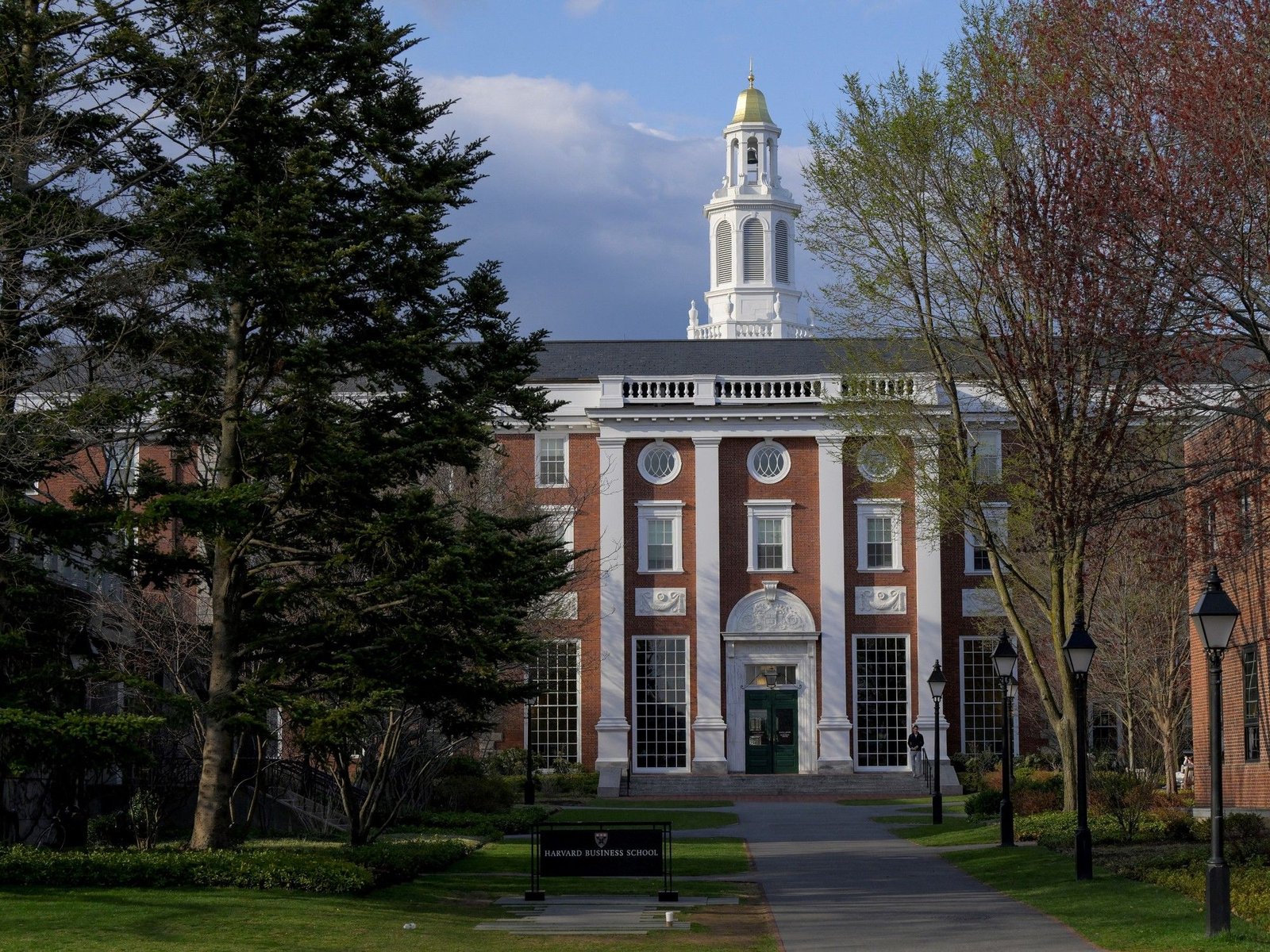
La universidad de Harvard calificó este jueves de «ilegal» la decisión del gobierno de Donald Trump de matricular a estudiantes extranjeros. En un comunicado, la institución consideró que la medida de la Casa Blanca respondía a una «acción de represalia».
«Estamos plenamente comprometidos a mantener la capacidad de Harvard para acoger a nuestros estudiantes y académicos internacionales, que proceden de más de 140 países y enriquecen a la Universidad -y a esta nación- de manera inconmensurable», dijo la prestigiosa universidad norteamericana en un comunicado.
En la misiva, la universidad manifestó que «esta acción de represalia amenaza con perjudicar gravemente a la comunidad de Harvard» y a los Estados Unidos. «Socava nuestra misión académica y de investigación», añadió.
Para la sección de Harvard de la Asociación Estadounidense de Profesores Universitarios, esta medida «amplía el asalto terrorista» de la administración Trump contra los estudiantes y académicos internacionales en Estados Unidos.
Cuando se revoca la certificación SEVP de una universidad, los estudiantes internacionales matriculados deben elegir entre trasladarse a otra institución, cambiar su estatus migratorio o abandonar el país, según el Servicio de Inmigración y Control de Aduanas.
«Para las universidades es un privilegio, no un derecho, matricular a estudiantes extranjeros y beneficiarse de sus elevados pagos de matrícula para ayudar a engrosar sus multimillonarias dotaciones», declaró la secretaria del Departamento de Seguridad Nacional (DHS), Kristi Noem.
A diferencia de universidades como Columbia, que aceptaron acatar la nueva política para que no se vean perjudicadas sus subvenciones, Harvard demandó ante la justicia a la administración Trump hace un mes por el intento de imponer cambios en su plan de estudios, sus políticas de admisión y sus prácticas de contratación.
La semana pasada, el gobierno del republicano anunció un nuevo recorte de 450 millones de dólares en subvenciones federales que se suma a la congelación de 2.200 millones más, de un total de 9.000 millones en revisión y la exclusión de cualquier nueva ayuda federal.
Con un patrimonio de 53.200 millones de dólares en 2024, Harvard es la institución de educación superior más acaudalada de Estados Unidos. Y, la más antigua, dado que fue fundada en octubre de 1636.
Mike Nellis, ex asesor jefe de la ex vicepresidenta demócrata Kamala Harris, dijo a través de su cuenta de X: «Que Donald Trump les diga a los estudiantes internacionales de Harvard que deben irse o transferirse es un repugnante abuso de poder. Es un buen recordatorio de que usará el poder del gobierno federal para cualquier cosa menos para mejorar sus vidas».
Donald Trump telling international students at Harvard that they need to leave or transfer is a disgusting abuse of power. It’s a good reminder that he’ll use the power of the federal government to do anything except improve your life. pic.twitter.com/ixO4nAPPxO
— Mike Nellis (@MikeNellis) May 22, 2025
En la misma plataforma, Alessandra Biaggi, ex senadora, dijo que el presidente «cree que es poderoso impedir que Harvard inscriba a estudiantes internacionales, cuando en realidad los mayores perdedores son Trump y sus soldados sin cerebro».
Bruce Robbins, académico de la Universidad de Columbia, brindó una entrevista a la cadena TRT World de Londres y sostuvo que «no se trata solamente de Harvard, es parte de un plan general. Involucrará a otras universidades».
«La administración Trump está tratando de destruir la educación superior. En Columbia los estudiantes internacionales están aterrorizados y se quedan en sus habitaciones», agregó.
Chuck Schumer, también representante de de los demócratas en el Senado, sostuvo que «este es un flagrante abuso de poder por parte de Trump para castigar a Harvard. Es una venganza sin fundamento fáctico ni legal, y perjudica a estudiantes inocentes».
Y agregó: «Esto es lo que hacen los autoritarios para acosar e intimidar a quienes se resisten a su poder y expresan libremente sus opiniones y su derecho a educar de acuerdo a estándares de excelencia e inclusión».
Universidad de Harvard,Inmigración,Inmigración en EE.UU,Donald Trump,Últimas Noticias
INTERNACIONAL
Una ola de crímenes, un intento de fuga y una víctima que se salvó: el caso del “asesino Casanova”

En la tarde del 18 de diciembre de 1974, agentes de la Oficina de Investigación de Georgia abrieron fuego en el asiento trasero de un patrullero: allí estaba Paul John Knowles, uno de los asesinos seriales más violentos y buscados de Estados Unidos.
Con apenas 28 años, el hombre que había confesado al menos 35 crímenes -aunque su participación solo se pudo comprobar en 18 de ellos- dejó atrás una de las olas delictivas más caóticas de la décadas.
Leé también: Una madrina, un ex FBI y una escena imposible: por qué el crimen de Jason Corbett sigue generando sospechas
Si bien su muerte cerró un caso enigmático, hasta la actualidad aún hay incógnitas que quedaron sin resolver, víctimas sin identificar y confesiones que no se pudieron verificar.
El “asesino Casanova”
Paul John Knowles nació el 25 de abril de 1946 en Orlando, Florida, y creció en un entorno inestable: vivió en hogares para chicos y, a los 19 años, terminó frente al sistema penal por una serie de delitos menores.
En 1974, estaba detenido en la prisión de Raidford cuando comenzó a mandarse cartas con Angela Covic, una mujer divorciada que vivía en San Francisco. Ella pagó abogados, gestionó su libertad y ambos se comprometieron.
Cuando Knowles llegó a California, Angela cambió de idea, ya que según declaró más tarde, él transmitía un “aura de miedo” que la aterrorizó desde el primer momento. La boda se canceló y él se marchó furioso.
Años después, el hombre afirmó haber asesinado a tres personas esa misma noche en San Francisco, aunque nunca se pudo comprobar.
Luego se instaló en Jacksonville, Florida, en donde siguió dedicándose al delito. Poco después apuñaló a un camarero en una pelea y fue detenido.
Sin embargo, su historia tuvo un punto de quiebre el 26 de julio de 1974, cuando rompió la cerradura de su celda y se escapó de la cárcel. Desde ese momento, su vida se convirtió en una secuencia de crímenes que se distribuyeron por varios estados y con víctimas al azar.
Una ola de asesinatos
Apenas horas después de su fuga, Knowles entró en la casa de Alice Heneritta Curtis, de 65 años, la amordazó y revolvió todas sus pertenencias. Se llevó dinero, objetos de valor y su auto. Poco después, la mujer murió por asfixia debido a la mordaza.
Durante las semanas siguientes, el asesino se movió entre Florida y Georgia. En sus confesiones grabadas mencionó el crimen de una adolescente llamada “Alma”, que luego fue identificada como Ima Jean Sanders, de 13 años, desaparecida el 1 de agosto de 1974 y encontrada muerta dos años después. También afirmó haber secuestrado y asesinado a dos hermanas, Lillian y Mylette Anderson, de 11 y 7 años, aunque los investigadores consideran estos hechos como confesiones falsas.
El 2 de agosto, mató a Marjorie Howie, de 49 años, en Atlantic Beach, Florida. Luego, el 23 de agosto, irrumpió en la casa de Kathie Sue Pierce en Musella, Georgia, la estranguló y dejó con vida a su hijo de tres años. Los investigadores que seguían a Knowles no lograron detectar un patrón claro en sus ataques. (Foto: The Atlanta Journal Constitution)
Uno de los momentos clave ocurrió el 3 de septiembre de 1974. William Bates, de 32 años, fue visto con un hombre pelirrojo -característica distintiva de Knowles- en un bar cerca de la ciudad de Lima, en Ohio. Días después, su auto había desaparecido y su cuerpo fue encontrado en un bosque con signos de estrangulación.
Con el auto robado de Bates, Knowles manejó hasta Nevada y, el 18 de septiembre, atropelló intencionalmente a Emmett y Lois Johnson, de 62 y 59 años, mientras acampaban cerca de allí. Ambos murieron al instante.
El 22 de septiembre, Ebon Charlynn Hicks desapareció en Texas. Su cuerpo fue hallado un año después al costado de una ruta: había sido violada y estrangulada. Su auto estaba abandonado en un área de descanso.
A finales de ese mes conoció a Ann Jean Dawson, una esteticista de 49 años. La mujer viajó con él -no se sabe si por decisión propia o secuestrada- y cubrió varios de sus gastos. Knowles aseguró haberla asesinado el 29 de septiembre y haber arrojado su cuerpo al río Misisipi. Sus restos se encontraron recién en 1977.
En octubre de 1974, Knowles se trasladó a Connecticut, en donde mató a Karen Wine y a su hija Dawn, de 35 y 16 años. Ambas fueron violadas, estranguladas y atadas en su casa de Marlborough.
Dos días después asesinó a tiros a Doris Hosey, de 53 años, utilizando el rifle del esposo de la víctima.
Alrededor del mismo período, grabó confesiones en audio y las envió por correo a un abogado. Las cintas fueron revisadas por un gran jurado en 1975, pero luego se destruyeron en una inundación del Palacio de Justicia Federal de Macon.
Para este punto, los policías de los diferentes estados estaban desconcertados, ya que lo que llamó más la atención fue la falta de un patrón claro para actuar como un asesino serial: no actuaba siempre del mismo modo ni buscaba el mismo tipo de persona. Para las autoridades, esto complicó las búsquedas en los primeros meses y permitió que siguiera moviéndose de un estado a otro sin levantar sospechas inmediatas.
En noviembre, irrumpió en la casa de Beverly Mabee, en West Palm Beach, y secuestró a su hermana, Barbara Abel. La mantuvo cautiva, la violó y finalmente la liberó.
Años después, Barbara contó su historia en una entrevista con People en la que dio detalles sobre la noche de terror que vivió junto al asesino serial. “Las noticias hablaban de mi secuestro y de cómo había matado a alguien. Estaba entusiasmado. Fue entonces cuando finalmente lo comprendí: quería ser famoso. Quería escribir un libro. Y como yo era redactora publicitaria de radio, le dije que podía ayudarlo. Mi trabajo fue lo que me salvó, porque este asesino en serie quería que yo contara su historia“, afirmó. Barbara Mabee Abel fue la mujer que sobrevivió al último ataque de Knowles. (Foto: People)
El día 16 de ese mes, un agente de tránsito de Florida reconoció el auto robado que el criminal conducía. Él logró sacarle la pistola, lo tomó como rehén, detuvo a otro conductor y secuestró a ambos. Luego los llevó a un bosque en Georgia y los ejecutó de un tiro en la cabeza.
La captura
Tras el doble homicidio, Knowles huyó durante una persecución policial que terminó con un choque en el condado de Henry, Georgia. Si bien intentó darse a la fuga a pie, disparó contra oficiales y fue perseguido por patrullas, perros y helicópteros.
Todo terminó cuando un vecino, David Clark, un veterano de la guerra de Vietnam que estaba cazando, lo sorprendió y lo retuvo a punta de escopeta hasta que llegaron los agentes. De esta manera, Paul John Knowles fue detenido el 17 de noviembre de 1974.
En los días siguientes, la policía comenzó a interrogarlo por su posible vínculo con varios homicidios sin resolver. Fue entonces cuando Knowles admitió su responsabilidad en al menos 35 asesinatos. También sugirió que había matado a más personas, aunque esas afirmaciones no pudieron ser corroboradas y quedaron sujetas a dudas.
Las autoridades cruzaron sus declaraciones con los informes de cada jurisdicción para intentar delimitar el alcance real de sus crímenes. Hasta hoy, ese número continúa siendo un punto de debate.
Un final lleno de incertidumbre
El 18 de diciembre de 1974, mientras era trasladado por agentes del estado de Georgia para colaborar en la recuperación de evidencia vinculada a uno de los crímenes, Knowles, apodado por la prensa como “el asesino Casanova» por su atractivo físico, intentó escapar.
Según la versión policial, se abalanzó sobre uno de los investigadores para quitarle el arma. En ese momento, otro agente le disparó tres veces y lo mató en el acto. Knowles fue detenido luego de secuestrar a una víctima que logró escapar y pedir ayuda. (Foto: 13WMAZ)
La muerte de Knowles puso un cierre definitivo a la posibilidad de llevarlo a juicio. Varias de las causas abiertas quedaron archivadas o con un procesamiento incompleto, porque no hubo proceso judicial que permitiera revisar cada uno de los hechos.
Las familias sólo pudieron acceder a partes parciales de la verdad, basadas en las confesiones del propio homicida, y en las pruebas que las fiscalías lograron reunir en los meses posteriores.
Leé también: “Mi padre es un monstruo”: el testimonio de la hija de BTK, el asesino serial que burló a la Policía
A pesar de la falta de un proceso judicial completo, los fiscales de los estados involucrados lograron cerrar algunos expedientes y confirmar su participación en 18 homicidios gracias a las autopsias, los rastros de ADN y las coincidencias en las escenas del crimen.
Sin embargo, otras causas quedaron en un “limbo” legal porque no había pruebas concluyentes, y las declaraciones de Knowles no alcanzaban para sostener una imputación formal sin un juicio.
Estados Unidos, asesino serial
INTERNACIONAL
NY Democrat warns extremism on left, right is ‘road to ruin’
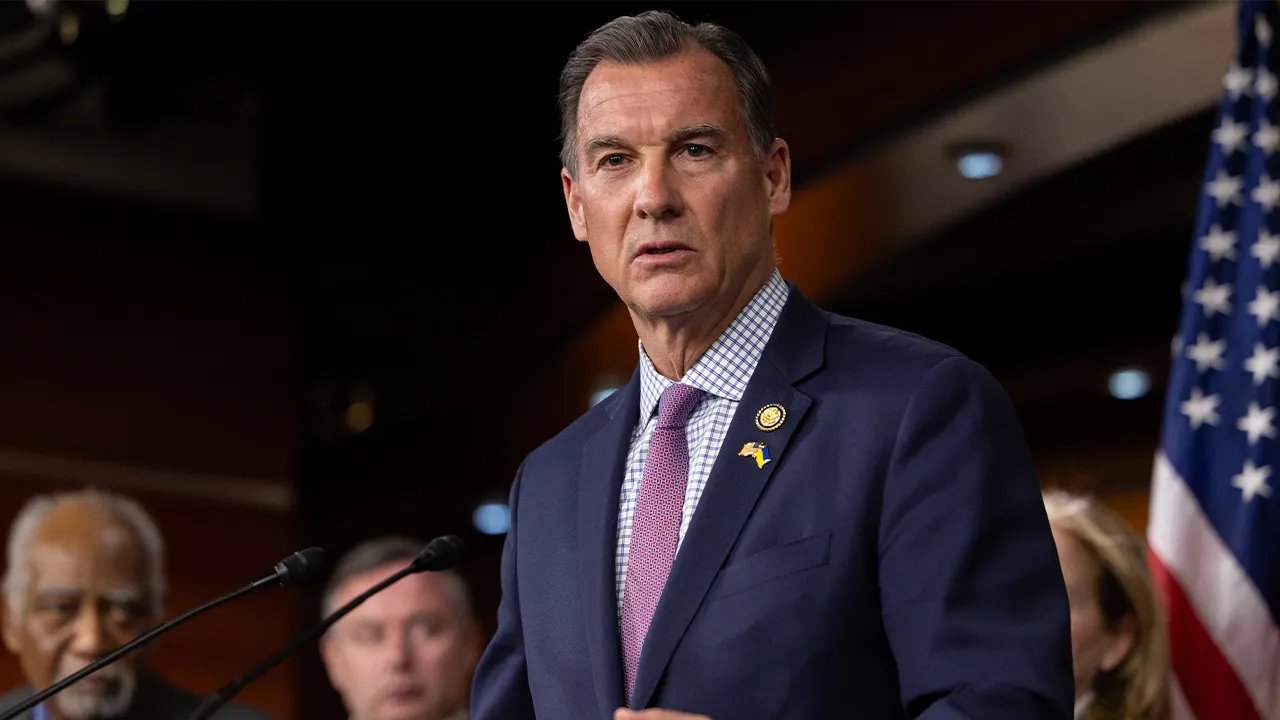
NEWYou can now listen to Fox News articles!
EXCLUSIVE: A moderate House Democrat representing a district that President Donald Trump won in 2024 is warning fellow elected officials, both within his party and the GOP, from pandering to the extremes of their base.
«It’s a road to ruin, because too many extremists, too many elected officials, are busy pandering to their base instead of listening to the general public and instead of trying to find common ground,» Rep. Tom Suozzi, D-N.Y., told Fox News Digital.
Suozzi said people on the far-left and far-right make up a relatively small — but active — section of both sides. He suggested that it’s a group that’s had an outsized influence in Congress as well.
«We have not seen much compromise these days. And everything has been, you know, one party or the other trying to do a my-way-or-the-highway partisan effort,» he said. «I’m sure both sides are inspired by good intention, but it’s not long-lasting, and it’s not going to help move our country forward.»
THE FAR LEFT HAVE TAKEN CONTROL OF THE DEMOCRATIC PARTY PLATFORM, AND IT’S TURNING VOTERS OFF
Rep. Tom Suozzi speaks at a press conference with other members of the Congressional Ukraine Caucus on the third anniversary of the Russia-Ukraine war on Feb. 24, 2025. (Nathan Posner/Anadolu via Getty Images)
Suozzi’s district encompasses part of the New York City suburbs of Long Island and includes part of the Big Apple itself as well.
But his district is not as progressive as other parts of New York that have shown support for socialist Mayor-elect Zohran Mamdani — whose candidacy Suozzi spoke out against on multiple occasions.
Suozzi did not answer directly when asked if Mamdani’s leadership in the city will affect him in the coming 2026 midterms, but he pointed out significant Republican gains in the district in the 2025 election cycle where he won.
«In Queens, in my portion of the district, Mamdani lost to Cuomo by 27%. And also, a Republican city councilwoman from the City of New York won in my district, and she won big. And then in my Long Island portion of it, which is not the city, but it’s right next to the city, Mamdani was weaponized by the Republicans in their races, and they won everything,» Suozzi said.
«I was always in a vulnerable district, because Trump won by 19,000 votes and I won by 11,000 votes, and I had to get 20,000 people who voted for Donald Trump to also vote for me,» he said. «But that’s still the case for me. So while there were a lot of Democratic victories throughout the country on Election Day, in my district, it still performed pretty Republican.»
He credited his success with «listening» to voters on both sides and reflecting those views in Washington.

Mayor-elect Zohran Mamdani speaks to members of the media at Flushing Meadows Corona Park in the Queens borough of New York on Wednesday, Nov. 5, 2025. (Adam Gray/Bloomberg via Getty Images)
«The reason I was successful in 2024 is because I was endorsed by the police, is because I was clear on my position on immigration, that we do need to secure the border, because I’m fighting for affordability. I mean, I feel like I’ve got to do what the people are asking to do,» he said.
Suozzi conceded that he believed both Trump and Mamdani were correct in their focus on the high cost of living.
«Mamdani was right, much like Trump is right, that people are economically insecure. They’re worried about their financial security. They properly diagnose the problem,» he said.
NY DEMOCRAT SNUBS PARTY LINE, BACKS CUOMO OVER SOCIALIST RIVAL IN HEATED RACE FOR NYC MAYOR
«The challenge is, you know, what’s the solution? I believe that socialism is a terrible solution. It will not work. It’s never worked in the history of the world. And it will not work now.»
But he urged Democrats nationwide to continue the focus on affordability, both trying to find solutions that are unique to their districts and on the federal level.
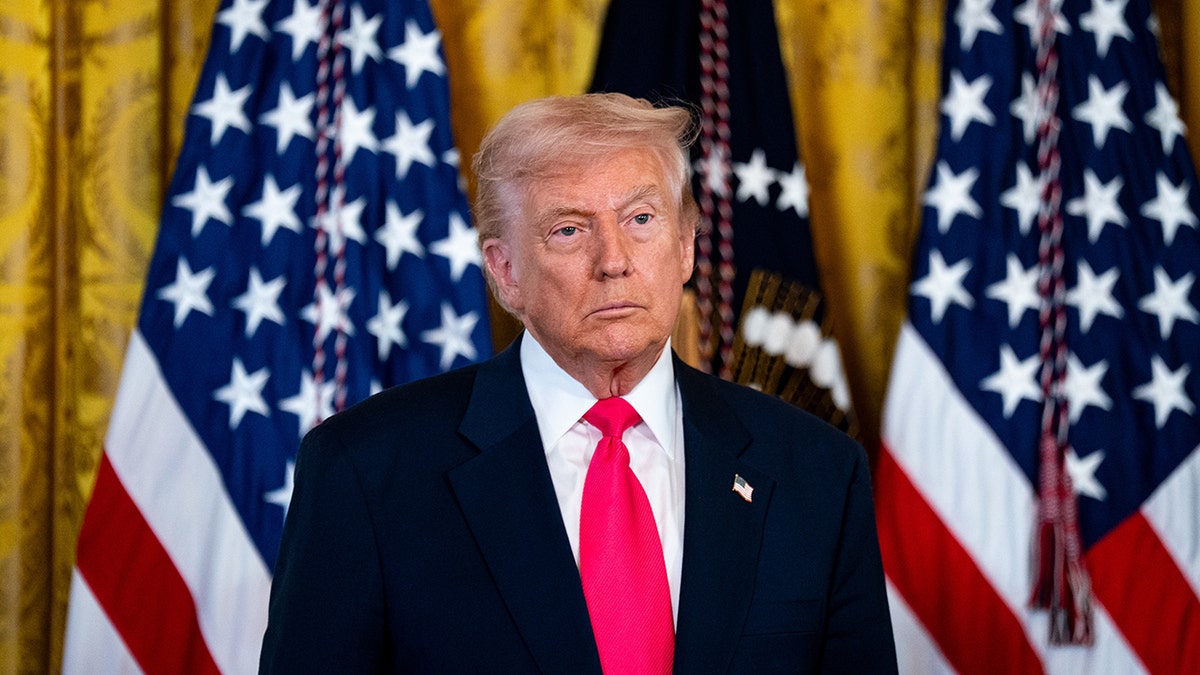
President Donald Trump is seen in the East Room of the White House in Washington on Nov. 13, 2025. (Al Drago/Bloomberg via Getty Images)
CLICK HERE TO DOWNLOAD THE FOX NEWS APP
One example he cited was the minimum wage, which has been $7.25 on the federal level since July 2009.
«That’s absurd, 20 states have a minimum wage of $7.25 an hour. We should be fighting to increase the minimum wage,» he said.
In the end, however, he called for a Democratic Party that errs away from socialism on the national level.
«We’ve got to be capitalist, not socialist. We’ve got to be mainstream, not extreme. We’ve got to be about safety, not lawlessness. We’ve got to be for reform, not the status quo,» Suozzi said. «We have to be proud of our country, not ashamed of our country.»
house of representatives politics,zohran mamdani,donald trump,democrats,politics
INTERNACIONAL
Anti-Israel group’s website reportedly offers bounties on heads of Israeli academics worldwide: ‘nutcases’

NEWYou can now listen to Fox News articles!
An anti-Israel group’s website is offering bounties of up to $100,000 for the murder of Israeli academics, according to reports.
«The Punishment for Justice Movement» not only named specific targets and prices on their heads, but also published personal information like home addresses, emails and phone numbers, the Jerusalem Post reported.
The academics who were targeted work at universities like Ben-Gurion University of the Negev, Hebrew University in Jerusalem, Tel Aviv University, the Technion public research university in Haifa, and even Harvard and Oxford universities, and the European Organization for Nuclear Research.
UNIVERSITY OF KENTUCKY PROFESSOR SUES AFTER BEING BARRED FROM LAW SCHOOL AFTER CALLING FOR AN ‘END’ TO ISRAEL
An anti-Israel website is offering bounties of up to $100,000 for the murder of Israeli academics, according to local reports. (AP Photo, File)
Along with offering $100,000 for the killing of «special targets,» $50,000 was being offered for the murder of other targets, as well as $20,000 to set fire to their homes or car, $5,000 for information about a target, and $1,000 to put protest signs outside their homes.
The website, created last summer and appears to have originated in the Netherlands, briefly went down Friday night, but was back up on Saturday, the outlet reported.
The website is written in English, according to the Times of Israel, and accuses its targets of being «criminals and collaborators with the occupation army,» referring to the war in Gaza.
It also accuses the targets of being «distributors of weapons of mass destruction to the Israeli army,» who are «involved in the murder of Palestinian children,» the Jerusalem Post reported.

The Punishment for Justice Movement allegedly named specific targets and prices. (James Sheppard/Future via Getty Images)
The organization claimed to have warned the targets to «abandon criminal activity» and stop working with the Israeli Defense Forces, but claimed they ignored the warnings so they are now «legitimate targets for the movement,» according to the Times.
Two targeted academics told the Post they received no warning and several of those targeted at the European Organization for Nuclear Research said they hadn’t worked on military projects, but the website creators seemed to be mixed up by the word «nuclear.»
One targeted academic told the Post: «The competent government agencies should suggest more comprehensive solutions» than just taking down the website, «because walking around with targets on our heads puts at risk not only us, but also our families.»

Harvard was one of the universities where academics were targeted on the website. ( Scott Eisen/Getty Images)
However, Michael Bronstein, who teaches computer science at Oxford, told the Post he didn’t «give a damn» about the bounty on his life, calling those threatening him «nutcases.»
CLICK HERE TO DOWNLOAD THE FOX NEWS APP
«I was profoundly disturbed and shocked that my head was valued so cheaply, considering my standing in the academic community, I find anything below a seven-figure highly offensive,» he told the Post. «I am, however, consoled that I am at least in a good company.»
Fox News Digital has reached out to the Anti-Defamation League for comment.
world,israel,terrorism

 POLITICA1 día ago
POLITICA1 día agoTras la orden de decomiso de los bienes de CFK, la Justicia evalúa avanzar sobre el departamento de San José 1111

 POLITICA2 días ago
POLITICA2 días agoJavier Milei sobre las coimas en la ANDIS: “Hay mucha mala intención política”

 ECONOMIA3 días ago
ECONOMIA3 días agoEl Gobierno invierte USD 300 millones en la compra de 43 trenes nuevos para el AMBA

